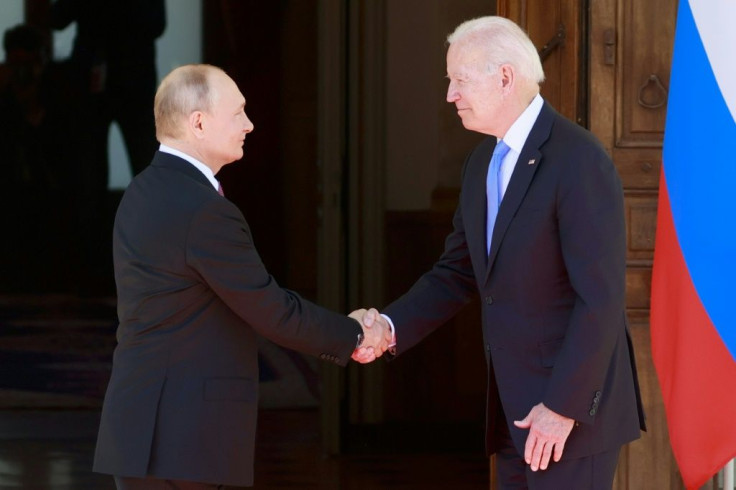Biden Calls Putin To Deliver Warning About Consequences For Any Invasion Of Ukraine
On Tuesday, President Joe Biden held a two-hour long video call with Russia’s President Vladimir Putin amid a new standoff over Ukraine.
“I welcome you, Mr. President,” Putin said from his residence in the Russian city of Sochi, according to Russian state television.
“Good to see you again,” Biden responded from the Situation Room. "I am hoping next time we meet we do it in person.”
According to a readout provided by the White House after the call, Biden imparted on Putin the United States and its NATO allies' resolve to respond with "strong economic and other measures in the event of military escalation", but called for a "return to diplomacy". It added that the two agreed to task their respective officials to take up the task of advancing these goals.
It was reported that Biden spoke with his European counterparts in advance and will brief Ukraine’s President Volodymyr Zelensky after his call with Putin at a later date. On Monday, Zelensky spoke with Secretary of State Antony Blinken to coordinate their actions related to Russia.
“Grateful to U.S strategic partners & allies for the continued support of our sovereignty & territorial integrity. Nothing about Ukraine without Ukraine,” Zelensky tweeted on Monday.
Agreed positions with @SecBlinken before the phone conversation of Presidents Biden and Putin. Agreed to continue joint & concerted action. Grateful to __ strategic partners & allies for the continued support of our sovereignty & territorial integrity. Nothing about __ without __
— Володимир Зеленський (@ZelenskyyUa) December 6, 2021
This meeting follows weeks of suspense as over 175,000 Russian soldiers gathered along the border with Ukraine’s eastern Donbass region. U.S officials suspect that it could be preparation for a military operation within the next month and the intelligence community has shared this intelligence with its NATO partners in Europe.
On Tuesday, CIA Director William Burns said that it was unclear if Russia has made up its mind to invade Ukraine, but cautioned that at the very least it was putting the means in place to do so in a “sweeping manner” if the situation called for it.
“We don’t know that Putin has made up his mind to use force,” said Burns at the Wall Street Journal’s CEO Council Summit. “But what we do know is that he’s putting the Russian military, Russian security services in a place where they could act in a very sweeping way.”
The Biden administration and NATO each warned Russia that there will be severe economic consequences to any military offensive on Ukraine. Russia has denied that it is seeking to attack Ukraine and accused the West of spreading disinformation.
President Biden entered into this meeting with Putin with much at stake since their last bilateral meeting in Geneva, Switzerland in June. Biden’s administration has sought to avoid serious escalations with Russia since arriving in office, preferring instead to focus on combating climate change and competition with China.

The lead-up to Tuesday’s meeting echoed the series of events that led to Biden and Putin’s first meeting. In April, Russian forces massed on the border of Ukraine and conducted large-scale naval drills in the Black Sea. These maneuvers concerned the West and Kyiv that Moscow was preparing for a new military operation into Ukraine, and they did not want to be caught off-guard as they were in 2014 when Russian forces annexed the Crimean Peninsula.
Now on his fifth U.S president since coming to power in 2000, Putin was complimentary about Biden following their summit in Geneva. This early warmth did appear to yield some successes by reopening contacts between U.S and Russian diplomats that have been closed for years, particularly on visa services and cybersecurity.
But this has not been enough to overcome the serious differences between the two nations or the stalling of diplomatic progress on Ukraine.
On Monday, cybersecurity researchers reported that Russian cyber espionage has hardly abated since last year's SolarWinds hack was revealed. Meanwhile, Russian diplomats in the U.S complained that Washington was refusing to renew visas for their staff, prompting Moscow to order the U.S embassy to downsize in response.
Russia has also grown frustrated with Ukraine under Zelensky. It has accused Zelensky of failing to oblige by the 2014 Minsk Agreement and has noted its frustration with its military modernization that has been helped by the United States, Britain and Turkey. NATO exercises with Ukraine in the Black Sea have also drawn Russian ire for taking place too close to Crimea and for involving strategic assets like nuclear-capable bomber aircraft.
In a pair of speeches last month, Putin laid out Russian grievances with the West. He accused the NATO alliance of disregard for Russia’s own “red lines” in Eastern Europe and of seeking to establish military positions on Ukrainian territory that he added could call Russian security into question.
“We’re constantly voicing our concerns about this, talking about red lines, but we understand our partners – how shall I put it mildly – have a very superficial attitude to all our warnings and talk of red lines,” Putin said at a gathering of the Russian diplomatic corps on Nov. 18.
Putin has also called on NATO to agree to a legal guarantee that Ukraine would not be allowed to join the alliance. Jens Stoltenberg, the NATO Secretary General, pointedly rebuked this, arguing that Russia “has no veto” over who may join its ranks.
President Biden echoed this sentiment on Saturday, saying that he will not "accept anybody's red lines".
However, there is a possibility that Washington can assuage the Kremlin’s concerns somewhat in the coming months. According to the Washington Post, the White House ordered a review by the Pentagon of all military exercises taking place in Europe. Officials insisted that the evaluation was aimed at ascertaining the policy purpose of these maneuvers and did not commit to curtailing any right away.

© Copyright IBTimes 2025. All rights reserved.





















